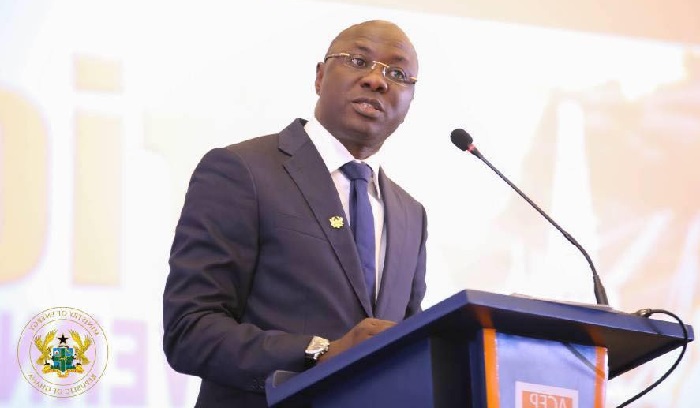Ghana’s plan to restructure $13 billion of Eurobond debt rejected last month by the International Monetary Fund is back on track, thanks to stronger-than-expected economic growth in the West African nation.
The IMF informed Ghana in April that its proposal did not meet a key debt sustainability requirement. But 2023 growth was almost double the level forecast by the Washington-based lender, moving the needle for a fresh debt assessment being prepared by the fund.
That report will likely show the debt target can be met and Ghana’s Eurobond revamp now passes muster, according to people familiar with the talks who asked not to be identified before a public announcement.
The deal is one of the remaining parts of a sprawling year-long effort by Ghana to restructure almost all of its $42.2 billion of debts, after it stopped making payments on external obligations in late 2022.
The first agreement reached with Eurobond holders missed a requirement to reduce Ghana’s 2028 debt ratio to 55% of gross domestic product by about just one percentage point, Minister of Finance Mohammed Amin Adam said last month.
Fourth quarter data showed Ghana’s economy grew 2.9% last year, beating the IMF’s projection of 1.5% that was used in the existing debt assessment. The new DSA is therefore expected to show lower debt ratios for 2023 and beyond.
An IMF official said an updated debt sustainability analysis is being prepared and will be presented to the fund’s executive board by the end of next month.
The IMF has granted Ghana a $3 billion emergency funding. The fund reached staff-level agreement under a second review of the program, clearing the path for a disbursement worth $360 million. It still needs Executive Board approval and would bring total disbursements so far to $1.56 billion.
The holdup over the Eurobond revamp talks follows Ghana’s success in concluding a domestic debt rework last year and an agreement in principle it reached with bilateral lenders in January.
It is now seeking to conclude talks on reorganizing the Eurobonds but negotiations have reached a point where the new DSA is needed to show the way forward, the people said. All the terms agreed in the earlier deal, including a 33% effective nominal haircut for Eurobond holders, remain unchanged, one of the people said.
A spokesperson for the finance ministry declined to comment when contacted by phone.
The world’s second-largest cocoa producer does not need a deal with bondholders for a favorable review by the IMF board for the next release of funds.
But it does need agreement with official creditors on a memorandum of understanding consistent with the agreement-in-principle on debt treatment it reached earlier this year, the IMF spokesperson said. The draft MOU will be ready by the end of May, one of the people said.
Latest Stories
-
Report tobacco users who smoke publicly – FDA advises
23 minutes -
Abdallah Ali-Nakyea elevated to Associate Professor at UG School of Law
52 minutes -
Kick2build commissions 5 libraries in Klo Agogo, donates school supplies
58 minutes -
Slim and Fit Ghana donates to kids at Motherly Love Orphanage in Kwabenya
1 hour -
We’ll be reorganising ourselves for the battles of tomorrow – NPP
1 hour -
Ghanaian teacher Morkporkpor Fiador’s GWR Read-A-Thon attempt postponed
1 hour -
Revocation of licences of UT, Capital banks were strict requirements from IMF – Dr. Addison
1 hour -
MP Cynthia Morrison among 280 members expelled by Agona West NPP
2 hours -
NPP to set up committee to investigate 2024 election defeat – Stephen Ntim
2 hours -
New Juaben North NDC executives intercept 24k bags of fertiliser at Koforidua
3 hours -
Luigi Mangione pleads not guilty to murdering healthcare CEO
3 hours -
GhLA opens applications for 2nd Edition of Youth Advocacy Challenge
3 hours -
Remote Work in Africa; the Doballi solution
3 hours -
Stephen Ntim rallies NPP members after 2024 election loss
3 hours -
AratheJay ignites the night with mesmerising ‘Nimo Live’ debut concert
3 hours

